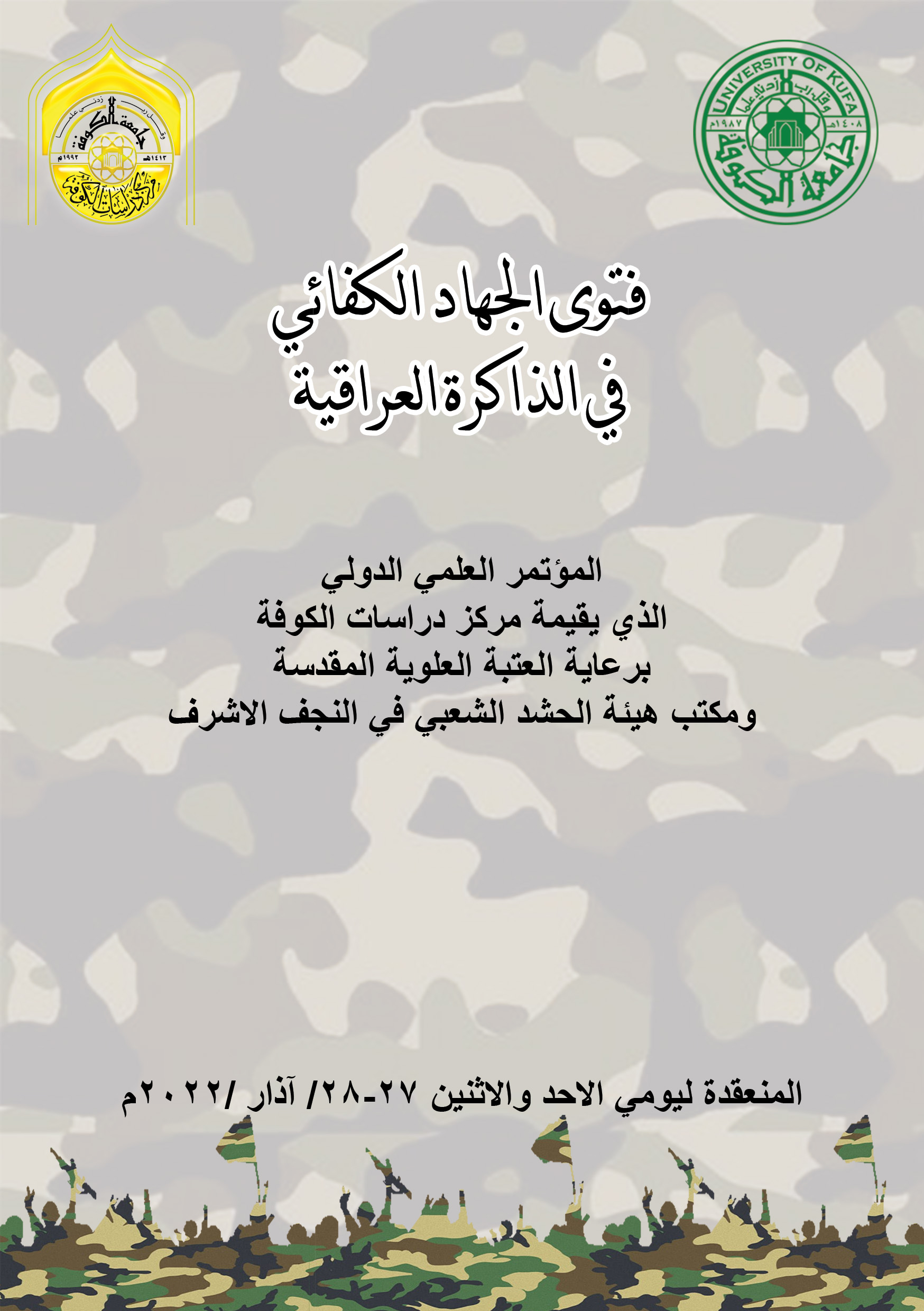Psychological, educational and historical dimensions in the fatwa of competent jihad Grand Ayatollah Sayyid Ali al-Sistani, may his long shadow be long
DOI:
https://doi.org/10.36322/jksc.v2i69.13153Keywords:
Psychological dimensions, Competent jihad, Ali al-SistaniAbstract
The fatwa of the efficient jihad of Grand Ayatollah Sayyid Ali al-Husseini al-Sistani "Long as his lush shadow" constituted a practical guiding point for the basic dimensions needed by Iraqi society to regain the initiative in preserving its existence, during the pivotal crisis, which was accompanied by the state of brokenness, chaos and a sense of internal defeat.
Among those dimensions is the psycho-educational dimension to restore the spirit of faith and its behaviors in the hearts of the Iraqi society and the security forces in this critical crisis, and the other dimension is the historical dimension included in the texts of the blessed sermon, which confirms the continuation of confrontation with evil throughout history, and the need for constant preparedness and preparedness.
With regard to the psychological and educational dimension, which according to educational theories targets three aspects (the cognitive aspect, the emotional side, and the skill side), the first sermon included linking society with the awaited Imam Ajl Allah Almighty Farjah Al-Sharif, especially since the incidents occurred in the blessed days of his birth, as this matter constitutes a doctrinal basis that requires being strongly invoked among members of society for what constitutes a starting point to enhance their psychological stability, as well as provoking the cognitive aspects of the knowledge of Imam ×, and the emotional aspects that stabilize the heart On the doctrine and skill aspects that make society effective, by promoting this knowledge and this belief in fighting skills and defending the faith.
As for the historical dimension, it constituted a state of establishment of the psycho-educational dimension because of its impact on evoking the line of Islamic jihad against the forces of darkness throughout history and its results that led to the victory of the righteous and the steadfast over their faith, through the blessed Quranic verses, and the narrative texts about the imams ^ referred to in the blessed sermon, as well as the centrality of the nation's return to Ahl al-Bayt ^, especially in times of difficult crises and accidents that only Ahl al-Bayt can face ^.
Downloads
References
- القرآن الكريم.
- ابن ابي الحديد، عز الدين بن عبد الحميد (ت 656هـ)، شرح نهج البلاغة، تحقيق، محمد أبو الفضل إبراهيم، ط1، دار احياء الكتب العربية، بيروت، 1959.
- ابن شبة، أبو زيد عمر (ت 262هـ)، تاريخ المدينة، تحقيق، فهيم محمد شلتوت، دار الفكر، قم، 1410.
- الاردبيلي، أحمد بن محمد(ت 993هـ)، زبدة البيان في احكام القرآن، تحقيق، محمد باقر البهبودي، المكتبة المرتضوية، طهران، د – ت.
- البياتي، وليد محمد علي، تطور الفكر الإمامي في العصر العباسي (260-447هـ)، رسالة ماجستير، جامعة القادسية، 2007م.
- البياتي، وليد، تطور الفكر الإمامي في العصر العباسي(260-447هـ)، رسالة ماجستير، جامعة القادسية، 2007م.
- الجواهري، حسن، بحوث في الفقه المعاصر، ط1، دار الذخائر، بيروت، د – ت.
- الحسني، هاشم معروف، تاريخ الفقه الجعفري، دار النشر للجامعيين، د – م، د – ت.
- الحكيم، محمد باقر، دور أهل البيت في بناء الجماعة الصالحة، مجمع العالمي لأهل البيت(ع)، ط2، د-م، 1425.
- الدليمي والهاشمي، طه حسين وعبد الرحمن عبد، المناهج بين التقليد والتجديد، دار أسامة، ط1، 2008.
- الراوندي، قطب الدين (ت573هـ)، الخرائج والجرائح، تحقيق، مؤسسة الإمام المهدي، ط1، مؤسسة الإمام المهدي، قم، 1409هـ .
- الريشهري، محمد، القيادة في الإسلام، ترجمة، علي الأسدي، ط1، دار الحديث، قم، د-ت.
- زاير ويونس، سعد علي و رائد رسم، اللغة العربية مناهجها وطرائق تدريسها، دار المرتضى، 2012.
- الصدوق، أبي جعفر محمد بن علي بن الحسين بن بابويه (ت381هـ)، كمال الدين وتمام النعمة، تحقيق علي أكبر الغفاري، مؤسسة النشر الإسلامي، قم، 1405هـ.
- من لا يحضره الفقيه، تحقيق، علي أكبر غفاري، ط2، جامعة المدرسي، د - م، 1404هـ.
- الطباطبائي، محمد حسين، تفسير الميزان، مؤسسة النشر الإسلامي، قم، د – ت.
- الطبرسي، الفضل بن الحسن(ت548هـ)، الاحتجاج، تحقيق، محمد باقر الخرسان، دار النعمان، النجف الأشرف، 1966م.
- تفسير مجمع البيان، تحقيق، لجنة من العلماء، ط1، مؤسسة الأعلمي، بيروت، 1995.
- الطبري، محمد بن جرير (ت 310هـ)، تاريخ الطبري، تحقيق، نخبة من العلماء، ط4، مؤسسة الأعلمي، بيروت، 1983.
- الطوسي، أبو جعفر محمد بن الحسن (ت460هـ)، التبيان في تفسير القرآن، تحقيق، أحمد حبيب قيصر، ط1، مكتبة الاعلام الإسلامي، د-م،1409.
- الغيبة، تحقيق، عباد الله الطهراني، علي احمد ناصح، ط1، مؤسسة المعارف الإسلامية، قم، 1411هـ.
- العتبة العباسية المقدسة، خطب الجمعة توثيق وتحقيق، تحقيق، شعبة الدراسات والنشرات، ط1، كربلاء، 2017.
- فتح الله، احمد، معجم الفاظ الفقه الجعفري، ط1، مطابع المدخول، الدمام، 1995م.
- المالكي، فاضل، الغيبة الصغرى والسفراء الأربعة، ط1، مركز الأبحاث العقائدية، قم، 1420هـ.
- الكاظمي، عماد، المرجعية الدينية ودورها في بناء الدولة العراقية، ط1، العتبة العباسية المقدسة، كربلاء، 2018م.
- المجلسي، محمد باقر (ت1111هـ)، بحار الأنوار، ط2، مؤسسة الوفاء، بيروت، 1983.
- المفيد، محمد بن محمد النعمان (ت413هـ)، الفصول العشر في الغيبة، تحقيق، فارس الحسون، ط2، دار المفيد، بيروت، 1993م.
- النعماني، محمد بن إبراهيم (ت380هـ)، الغيبة، تحقيق، فارس حسون كريم، ط1، أنوار الهدى، قم، 1422هـ.
- الواقدي، محمد بن عمر(ت207هـ)، المغازي، تحقيق، مارسدن جونس، دانش إسلامي، 1405.
- اليوسفي، محمد هادي، موسوعة التاريخ الإسلامي، ط1، مؤسسة الهادي، قم، 1417.
Downloads
Published
How to Cite
Issue
Section
License
Copyright (c) 2023 م.د. أحمد فاضل حسون المسعودي ، م.د. مصطفى هيل صخيل الأنباري

This work is licensed under a Creative Commons Attribution 4.0 International License.
Permit others to distribute and copy the manuscript, to create extracts, abstracts, and other revised versions, adaptations, or derivative works of or from the manuscript (such as a translation), to include in a collective work, to text or data mine the article, even for commercial purposes, as long as they credit the author(s), do not represent the author as endorsing their adaptation of the article, and do not modify the article in such a way as to damage the author''''s honor or reputation. Further details are found at Creative Commons Attribution 4.0 International (CC BY 4.0)






























